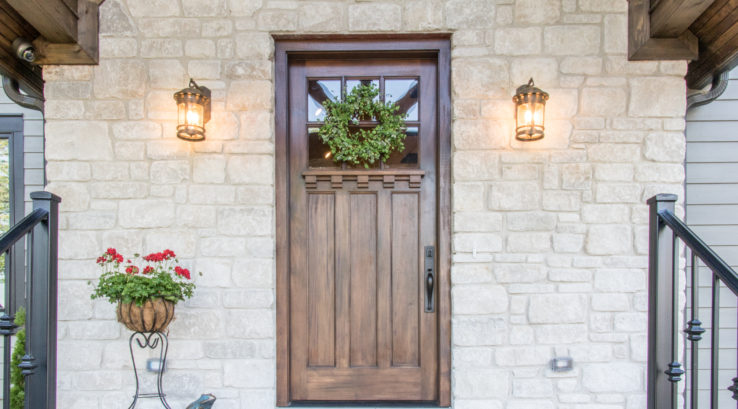A door’s material is a top consideration when shopping for a new exterior door, which often brings homeowners to the great fiberglass vs. wood door debate. While both door materials perform well overall, the benefits of fiberglass doors are plentiful when comparing pros and cons. As you evaluate the essential details of a front entry door, you’ll see why fiberglass exterior doors are the better choice.
What Are The Benefits?
To compare the merits of fiberglass vs. wood doors, consider energy efficiency, security, durability, and maintenance requirements. However, many homeowners often place aesthetics above practicality, and wood doors often outperform other types of doors in terms of appearance.
The look and feel of genuine hardwood doors are difficult to beat. Modern fiberglass exterior doors have options that closely mimic wood, but a close inspection reveals the difference. Nevertheless, fiberglass doors look stunning and come in many unique design styles, colors, and finishes to give you the exact look you want.
Energy Efficiency Comparisons
Insulated fiberglass exterior doors are more energy-efficient than wood doors because fiberglass-clad entry doors have high thermal resistance or R-value. A fiberglass door that’s 1.5 inches thick without a window has more than five times the insulating value of an equal-sized wood door. National Fenestration Rating Council labels reveal energy performance ratings, so you can choose an energy-efficient door that helps lower your heating and cooling bills.
Comparing Safety and Security
Keeping your family safe should be a top concern when purchasing a new exterior door because it’s the primary entryway into your home. A wooden door that’s deteriorated from rot will be less secure and much less effective at keeping intruders out.
When properly installed, the solid construction of fiberglass entry doors offers greater security compared to most wooden doors. Fiberglass is extremely sturdy and strong for its weight and won’t become weakened from rot or rusted-out areas. Because composite door frames won’t rot, they provide a stronger hold for screws, providing even greater security.
Durability Evaluations
Although wooden doors are durable, they’re susceptible to damage from prolonged exposure to sun, rain, snow, humidity, and other elements. Fiberglass resists the effects of harsh weather and lasts longer, without the rotting, splitting, peeling, or delaminating that occurs in wood. Unlike wood, fiberglass also won’t shrink, swell, warp, or bow from fluctuations in temperature and moisture content.
Exterior fiberglass doors are molded with no breaks or seams, so they’re impervious to moisture and rot. Wooden doors are naturally sensitive to moisture and will deteriorate over time, even with constant upkeep. Fiberglass doors typically outlast wooden doors and often come with long warranties.
Maintenance Requirements
Maintenance is another consideration in the fiberglass vs. wood door debate. Wood doors require ongoing maintenance and significantly more time and attention than fiberglass doors. Wood exterior doors typically require annual refinishing, including repainting or restaining, and mold may grow on them from the absorption of moisture from the air.
Fiberglass entry doors require little to no maintenance and can last years without any adjustments, repairs, or painting. Fiberglass requires the least amount of maintenance of any material and requires only soap and water for cleaning.
Choose Reliable Thompson Creek Doors
At Thompson Creek, our front doors are built from the most durable, energy-efficient materials, including fiberglass and textured or smooth steel. Our custom entry doors are available in several designs and 16 designer color options to match the unique style of your home. Contact us today to learn how we design, build, and install the ideal doors for your needs and request a free estimate.


